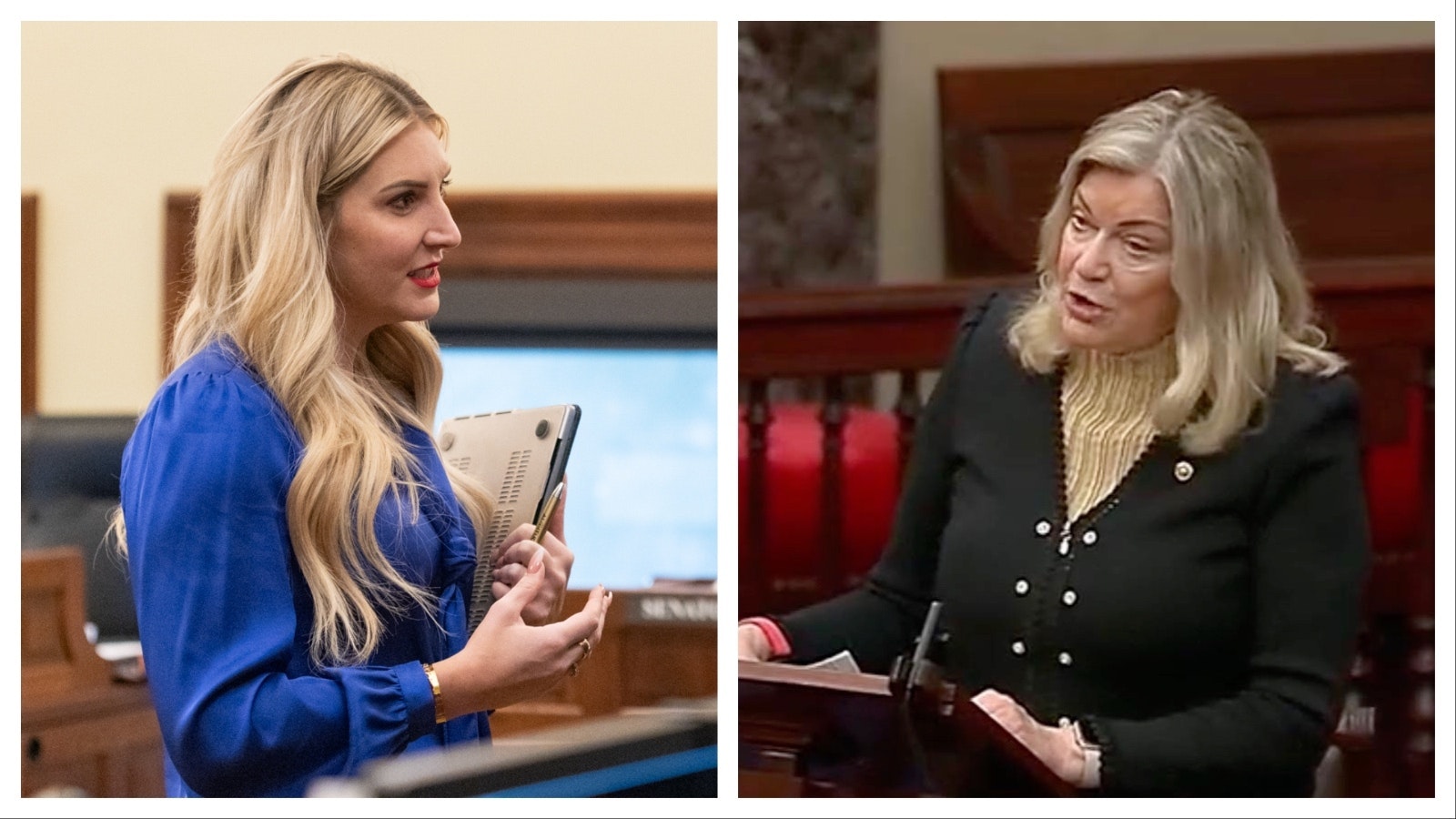CHEYENNE — “Wyoming solutions for Wyoming problems” has become a mantra in legislative circles of late, so much so that it probably could be printed on hats and T-shirts for the Wyoming Caucus, a contingency of state House Republicans.
Some have used the phrase to criticize what they see as a trend of national and identity politics worming their way into Wyoming.
But during a press conference Thursday at the state Capitol in Cheyenne, leading members of the Wyoming Caucus say the slogan isn’t a response to legislation brought by the far-right Wyoming Freedom Caucus, but rather a guiding point for what kind of legislation they would like to pass in the upcoming 2024 session.
“This is the priority list, and we’d like everybody to work with us and help support us,” said state Rep. Cyrus Western, R-Big Horn.
What Is And Isn’t A Wyoming Problem?
Determining what is actually a Wyoming problem opposed to issues more relevant to other states is not always so clear. Some have acknowledged the latter on certain nationally charged issues, but still argue that Wyoming should get ahead of problems before they become significant here.
“Look at our culture, look at the things that have broken down with our culture. We need to get ahead of these things,” Rep. John Bear, R-Gillette, chairman of the Freedom Caucus, told Cowboy State Daily.
Western said he makes that value judgment based on what his constituents tell him.
Rep. Barry Crago, R-Buffalo, agrees, but said that what he’s learned in politics is that it's impossible to make everyone happy.
“You’re doing what 10,000 people want … there’s a balance of interests,” Crago said. “For every person that wants this, there might be 10 people that don’t want it.”
Western mentioned property tax reform as an issue he believes needs immediate resolution and is a great example of a Wyoming problem.
“It’s something we’ve heard of, or heard from, across the board across the state,” Western said. “It’s on the streets of Sheridan, here in Cheyenne, Thermopolis — you name it.”
There will likely be at least 10 property tax bills considered during the upcoming session. One that Crago has brought would establish an exemption allowing for an immediate 5% residential property tax cap. A similar measure will be brought to voters in a constitutional amendment in November.
“It creates a cap without worrying about whether or not the constitutional amendment will pass this fall,” Crago said.
Western and Rep. Clark Stith, R-Rock Springs, also mentioned parental rights and school choice as other predominant issues on the minds of Wyomingites. Last year, a lawsuit was filed in Rock Springs by a couple against their local school district for allegedly helping to gender transition their child behind their backs without notifying them.
Middle, Not Extremes
Crago said it’s his goal to find consensus on issues rather than being “on the extremes of ideas” with other lawmakers in the Legislature.
Without that consensus, important legislation “probably won’t pass,” he said. “If we actually want to solve a problem, we’re going to have to work with all sorts of people.”
One of those olive branches is a school choice bill originally proposed by House Speaker Albert Sommers, R-Pinedale, that would allow low- and some middle-income parents to use the state’s per-pupil allocation to pursue private education for their children. Although some conservatives have criticized the bill for its income criteria, Sommers stresses that it’s his attempt at finding a middle ground on the topic of school choice.
Another example is Senate File 9, a parental rights bill that would require schools to inform parents about any changes made to their student’s health status, including gender transitioning.
“Some people have urged for us to essentially adopt Florida’s law on intellect and education, but what Senate File 9 does is say we have a particular problem here and let’s solve that, but let’s let local school boards deal with other issues as best as they can,” Stith said.
Some in the Wyoming Caucus have criticized the Freedom Caucus for allegedly copying and pasting legislation from other states, such as a parental rights bill brought in 2023 that was very similarly worded to legislation passed in Florida.
Bear said if that bill had passed into law, the issues that the Rock Springs couple is dealing with would already be effectively addressed.
Rep. Jeanette Ward, R-Casper, a member of the Freedom Caucus, released a bill Tuesday that would, among other things, require people to use bathrooms associated with their biological sex at birth. About a dozen other states have passed similar legislation, but Wyoming has a much smaller transgender population than those places.
Stith acknowledged he has taken some inspiration from more than 10 other states when helping craft his own parental rights bills in the past, but said he still tailored the legislation to fit Wyoming.
“The goal here was to find something that fits our situation,” Stith said.
Bear said Freedom Caucus members take the same approach with their bills.
Crago also stressed that just because a legislator votes against a bill doesn’t mean he or she disagrees with its overall purpose. Its constitutionality and chance of passing is also considered.
“Good ideas don’t always make good bills,” he said. “Words on the paper matter.”
What Will Happen?
In the lead up to the upcoming session, there has been some handwringing among Wyoming legislators, lobbyists and politicos that very little legislation aside from the 2025/2026 biennial budget will get passed because of a clear divide between legislators in the Wyoming Caucus and Freedom Caucus.
During the budget session, a non-budget bill needs a ⅔ vote to be introduced and sent to a committee for consideration. The upcoming session will be the first budget session where the Freedom Caucus has enough members to block legislation it doesn’t support.
Stith said he hopes fellow legislators will give bills a chance to be considered by voting to support their introduction, something the Wyoming Caucus will need help with.
Bear said as long as he and his fellow Freedom Caucus members believe there is a chance they will eventually vote for a bill down the road, they’ll allow it to be introduced. As far as working together and finding compromise to get bills passed, Bear said he and other Freedom Caucus members aren’t opposed to finding a middle ground as long as it doesn’t infringe on what he believes to be Wyoming values.
“We always take bills and work them as a group of 62 (representatives) but we want to pass good law that is good for the people of Wyoming,” he said. “Some of the bills are going to require some discussion, but that can’t happen if they're left in the speaker’s drawer.”
Bear said he already has problems with Gov. Mark Gordon’s proposed $9.9 billion biennial budget, which he said will grow the government, thus putting a larger tax liability on the taxpayer.
“There will be a considerable growth of government if the Joint Appropriations Committee doesn’t pull that back some,” Bear said.
Although he said he understands some increases to address inflationary pressures, Bear said he will absolutely not support any spending measures that grow the government in any way.
“Anything above and beyond that is a hard no,” he said.
Leo Wolfson can be reached at leo@cowboystatedaily.com.





